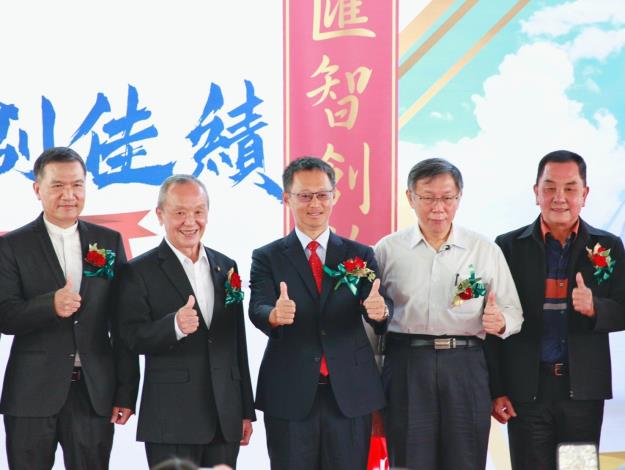Mayor Encourages Industries to Help Boost Taiwan’s ICT Capabilities
![]() Mayor Ko Wen-je attended the inauguration for the newest factory plant of Phison Electronics Corporation and the beam-raising ceremony for its neighboring vehicle loading area on November 21.
Mayor Ko Wen-je attended the inauguration for the newest factory plant of Phison Electronics Corporation and the beam-raising ceremony for its neighboring vehicle loading area on November 21.
During his address, the mayor remarked that the government has little understanding about the market compared to industry players. Therefore, all the government can do is strengthen infrastructure construction. Even though the public sector can assist industries to tackle obstacles, the main thrust still relies on the efforts of the private sector. Hopefully, they can continue to build upon the existing foundation and further consolidate Taiwan’s stance as a competitive force among ICT-advanced nations.
Ko mentioned that CEO Pan of the company began his career as an overseas student from Malaysia. He joined some of his local friends to establish Phison Electronics Cooperation after graduation. In two decades’ time, the company has grown into the fourth largest IC chip design company in Taiwan and a major force in the global flash memory supply chain. The CEO is a model for young people, setting an example through hard work which contributed greatly to the development of Taiwan.
Going over some of Phison important milestones, the mayor pointed out that the company is not only a successfully in business, but also a company that proactively fulfills its social responsibilities and invests in sustainable and environmental protection endeavors.
He also shared details on Taipei’s Smart City Initiative, which involved the strategy of “from inside to the outside, and from public to private”. The government must learn how to work with the private sector to achieve private-public-partnership. It has to tackle things that businesses and enterprises dare not, cannot, and prefer not to handle – such as projects that are extremely risky or of a grander scale. Having noted the low performance rate of Taipei’s living lab approach in the past, the city government changed its approach to leverage its budget of NT$180 billion to procure smart solutions to tackle scenarios Taipei encounters.


![Taiwan.gov.tw [ open a new window]](/images/egov.png)
